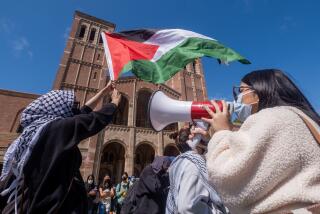Federal Bastion Raises a Peace Flag
ALEXANDRIA, Va. â One day when historians scour old newspaper clips to glean Americaâs mood as war seemed to grow ever closer, the town meeting here to discuss the possible invasion of Iraq may escape unnoticed -- a minor event that made no news, changed few minds and maybe wasnât even representative of the nation as a whole.
But in an overflowing school auditorium Monday night, at a forum with their congressman, a two-star Marine general and an assistant secretary of Defense, the citizens of Alexandria spoke of overwhelming concerns about war with Iraq, and particularly its aftermath. Their antiwar sentiments sounded like those heard in France and Germany.
The message was surprising because Alexandria, across the Potomac River from Washington, is on the front lines of the war on terror.
The Pentagon is nearby, and the federal court where charges against some terrorists have been filed is located here. Six percent of Alexandriaâs 133,000 residents work for the Defense Department.
âIf you live in Cincinnati, youâre not likely to be the subject of a terrorist attack. Here itâs already happened,â said Steve Dujack, editor of an environmental publication. âSo our concern is real. What happens as a result of Iraq is real.
âI was very much a supporter of the first Persian Gulf War. I thought our strategic interests were at stake. Iraqâs move into Kuwait was naked aggression. I thought there was a legal justification for war. But this war seems unabashedly put forth by a president to advance his political interests.â
Dujack was one of 600 people who turned out on a cold, drizzly winter evening for the town hall organized by James P. Moran, Alexandriaâs six-term Democratic congressman, who said he shared many of his constituentsâ concerns.
At Moranâs invitation, the Defense Department sent Maj. Gen. Kevin Kuklok, a Gulf War veteran, and Victoria Clarke, spokeswoman for Secretary of Defense Donald H. Rumsfeld, to explain the Bush administrationâs views.
Moran told the audience -- which was so unexpectedly large the school cafeteria had to be opened to hold the overflow -- that he thought Secretary of State Colin L. Powell had made a convincing case in condemning Iraq before the United Nations, and that he believed Saddam Hussein did indeed possess chemical and biological weapons.
But to loud applause, he questioned giving Iraq a higher priority than North Korea; not pressing harder for a diplomatic solution; the lack of debate over what happens to Iraq after the war; and the fact that âAmerican people have not been asked to bear any sacrifice. Weâve been given tax cuts and told to spend them at the malls.â
The audience snickered when Clarke said Bush had made no decision about military action. But it sat in somber silence when she said the casualties of the Sept. 11 attacks would pale in comparison to the death toll in a chemical attack. The country had changed since the attack on the World Trade Center in New York and at the Pentagon, she said: Inaction could pose a greater risk than action.
âI am an Iraqi Kurd,â said a woman, one of several dozen who lined up behind two microphones on the auditorium floor. âSaddam Hussein has gassed my family. He has cruelly bombed my brothers and sisters. I know what this man is capable of. And I am against this war. Against it! It will solve nothing.â
âThirteen years ago I bought a car that got 30 mpg,â said a man who believed the potential war was about oil. âToday you buy that same Ford and it gets 20 mpg. Can you explain that to me?â
âWhen you say the Iraqi threat is imminent, what do you mean by imminent -- a month, a year, 10 years?â asked a Vietnam War veteran. âI woke up in Tay Ninh one morning and half a North Vietnamese division was on our doorstep. Now, thatâs a clear and present danger. But I donât believe Saddam Hussein today presents a clear and present danger to the United States.â
The audience -- mostly middle-age professionals -- broke into sustained applause when the veteran said the nation was being led into war by men who had never gone to war. He thundered off half a dozen names: âGeorge Bush, hawk, did not fulfill his National Guard duty; Dick Cheney, hawk, did not serve; Paul Wolfowitz, hawk, did not serve; Richard Perle, hawk, did not serve.â
Applause also greeted Moranâs comment that, unlike what happened in the Vietnam era, âif we go to war, it is incumbent on all the American people to support our troops.â
If this was the face of a new antiwar movement in the auditorium, it had vastly different features from that in the 1960s and â70s.
âWhen you have a town hall meeting on an issue, youâre going to get the people who are most upset by the prevailing policy,â Moran said Tuesday. âSo last night, with probably 80% against the war, wasnât an accurate random sampling. Still, of the people who have contacted my office to express an opinion, 69% are antiwar.
âWhat surprised me the most was how closely people are following the issue. There was a level of sophistication a little higher than you might find in some areas of the country, like the South and Midwest, where people were calling my office Tuesday to call me a communist.â
More to Read
Sign up for Essential California
The most important California stories and recommendations in your inbox every morning.
You may occasionally receive promotional content from the Los Angeles Times.










